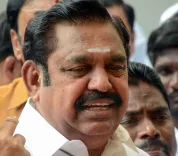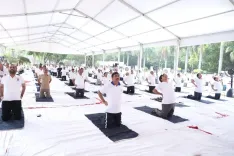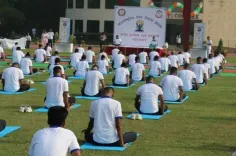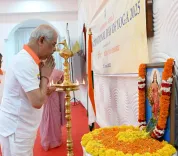Is India’s Silence on Israeli Attacks a Surrender of Values?
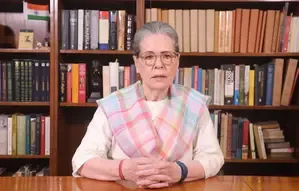
Synopsis
Key Takeaways
- India's silence on West Asia conflicts raises ethical concerns
- Call for re-engagement in diplomatic dialogue
- Humanitarian crisis in Gaza demands urgent response
- Importance of India's strategic relations with Israel
- Need for a balanced approach in foreign policy
New Delhi, June 21 (NationPress) Critiquing the government's foreign policy, Congress Parliamentary Party Chairperson Sonia Gandhi on Saturday described India's silence regarding the attacks on Iran and Gaza as a surrender of values and a significant shift from diplomatic traditions.
In her op-ed published in a newspaper, Gandhi urged for a reassessment of India's position on these crucial matters, asserting that it is not too late to defuse tensions and facilitate a return to dialogue in West Asia.
Labeling New Delhi’s perspective on the crises in West Asia as troubling, she emphasized, “In light of this humanitarian disaster, the Modi administration has nearly forsaken India's historical and principled commitment to a peaceful two-state solution, one that envisions a sovereign and independent Palestine coexisting with Israel in mutual security and dignity.”
The CPP Chairperson pointed out that India's silence regarding the devastation in Gaza and the unprovoked escalation against Iran reflects a concerning departure from our moral and diplomatic ethos.
“This signifies not merely a loss of voice but a complete surrender of values,” she remarked.
Calling on the government to act judiciously, Gandhi stated, “It is still not too late. India must articulate its stance clearly, act responsibly, and leverage every available diplomatic avenue to ease tensions and advocate for dialogue in West Asia.”
She further reminded of Iran’s profound civilizational connections with India as a compelling reason for New Delhi to work towards de-escalation in the region.
Highlighting the close relationship between India and Israel, the Congress leader encouraged the government to utilize its strategic ties to foster peace in the area.
“This unique position endows our nation with both the moral responsibility and diplomatic leverage to act as a bridge for de-escalation and peace. This is not merely an abstract principle; millions of Indian nationals are residing and working across West Asia, making stability in the region a matter of vital national interest,” stated the former Congress President.
In one of her most pointed critiques of Israel, Gandhi remarked, “Israel's recent actions against Iran have occurred in an environment of impunity, supported by near-unconditional backing from dominant Western nations.”
She reiterated that the Indian National Congress unequivocally condemned the horrific and unacceptable attacks by Hamas on October 7, 2023, but emphasized that we cannot remain silent in response to Israel's catastrophic and disproportionate retaliation.
She accused Israel of practicing double standards regarding nuclear weapons, highlighted by its intention to retain its nuclear arsenal while targeting Iran, a nation committed to the Nuclear Non-Proliferation Treaty.
Quantifying the toll in Palestine, the former Congress president stated, “Over 55,000 Palestinians have perished. Entire families, neighborhoods, and even hospitals have been decimated. Gaza teeters on the brink of famine, and its civilian population endures unimaginable suffering.”
Gandhi also criticized U.S. President Donald Trump for his perceived inconsistency regarding America’s military involvements.
She expressed disappointment that President Trump, who once criticized America's perpetual wars and the military-industrial complex, now seems inclined to follow this ruinous trajectory.
“He has repeatedly pointed out how misleading claims about Iraq having weapons of mass destruction led to a costly conflict that destabilized the region and caused immense destruction in Iraq,” she noted.
The Congress leader labeled Trump's statement on June 17, which dismissed his own intelligence chief's evaluation and asserted that Iran was ‘very close’ to acquiring nuclear weapons, as profoundly disappointing.
“The world seeks and requires leadership grounded in facts and propelled by diplomacy, not by force or falsehoods,” she concluded.

